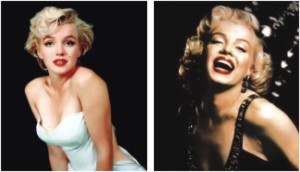
 By Musarrat Rahman
By Musarrat Rahman
…And exactly that she did. Without concern for what others would say, she beat her own fabulous path in the history of Hollywood as the glamorous and sexy playboy centerfold, Marilyn Monroe.
She was once a little girl called Norma Jean Baker, going from foster home to foster home and dreaming about one day becoming a star like her idol Jean Harlow. After her mother, Gladys Bakers, mental breakdown, Norma Jean moved in with her mother's friend Grace McKee Goddard. At 16, when Grace and her new husband had to move East and couldn't take her with them, Norma Jean married her then boyfriend Jimmy Dougherty making him the very first Mr. Marilyn Monroe.
The happy couple was split apart when Jimmy joined the Merchant Marines and was sent off to South Pacific in 1944. Young Norma Jean took up a job at the assembly line of the Radio Plane Munitions factory and it was there that photographer David Conover discovered her. To him she was the 'Photographers Dream' with her beautiful features and curvaceous body. Conover used her for his shoots and sent work her way and soon enough, Norma Jean was a reputable model with her picture on many popular magazine covers. The camera adored her and soon enough she was enrolled in acting classes to pursue the footsteps of her favorite stars!
But the return of Jimmy Dougherty in 1946 forced Norma to choose between her marriage and her career and so, Jimmy became the frist ex - Mr. Marilyn Monroe. She wasn't going to let a man get in the way of the superstardom she was destined for.
Norma Jean's life ended on august 26, 1946 when she signed her very first contract with Twentieth Century Fox and dyed her hair blonde. From the ashes of that life, like a phoenix, rose the beautiful seductress that took Hollywood by storm, Ms. Marilyn Monroe.
Marilyn's first movie role was a small part in 1947's The Shocking Miss Pilgrim. She played a series of small characters until 1950, when John Huston's thriller The Asphalt Jungle provided her with a small but influential role. Later that year, Marilyn's performance as Claudia Caswell in All About Eve earned her further praise. From then on Marilyn worked steadily in movies such as: Let's Make It Legal, As Young As You Feel, Monkey Business and Don't Bother to Knock. It was her performance in 1953's Niagara, however, that made her uber famous. She played Rose Loomis, a beautiful young wife who plots to kill her older, jealous husband
 The rest, as the saying goes, is history.
The rest, as the saying goes, is history.
Niagara's success led to her getting the leading role (along with Jane Russel) in the classic Gentlemen Prefer Blondes. The movie casted Monroe as the gold digging showgirl Lorelei Lee and made the song Diamonds are a Girls Best Friend famous inspiring generations of young women, including popstar Madonna. Her next film How to Marry a Millionaire, a comedy about three models scheming to attract a wealthy husband, teamed Monroe with Betty Grable and Lauren Bacall and received rave reviews about her versatile acting skills and 'dumb blonde' persona.
Her second marriage, to baseball player Joe DiMaggio in 1947, followed her success. From her honeymoon in Tokyo, Monroe traveled to Korea and performed for the American troops stationed there causing a near riot amongst the 13000 men and making new husband Joe insanely jeolous.
Unfortunately, Marilyn's fame as an actress and sexy icon, as well as the famous shot from the movie The Seven Year Itch where the skirt of Ms. Monroes white dress is billowed up by the air of the subway grates, became a constant strain on their marriage and, nine months later, Joe DiMaggio become the second ex-Mr. Marilyn Monroe.
Now Marilyn was ready to become a much more serious actress and shed her 'dumb blonde' image in the media. She took a hiatus from Hollywood and moved to New York City to study under Lee Strasberg at his Actors' Studio. In 1956, Marilyn started her own motion picture company, Marilyn Monroe Productions. The company produced Bus Stop and The Prince and the Showgirl (co-starring Sir Laurence Olivier). She also received further recognition for 1959's Some Like It Hot, which won her a Golden Globe for Best Actress in a Comedy.
Her third marriage, to playwright Arthur Miller ensued in 1956. The two met through Lee Strasberg and fell fast in love. While they were married, Arthur wrote the part of Roslyn Taber in 1961's The Misfits especially for Marilyn. The movie co-starred Clark Gable and Montgomery Clift. Sadly, the marriage between Marilyn and Arthur ended on January 20, 1961, and The Misfits was to be Marilyn's last completed film.
Her third failed marriage left poor Marilyn in tatters. The actress was suffering from depression and was borderline alcoholic. She also depended on sleeping pills and her psychiatrist. Her illness, both mental and physical, took a toll on her acting and she was rushed to the hospital a few times on 'near death' situations during filming.
On august 5, 1962, Marilyn Monroe, 36 years old at the time, died in her sleep in her home in Brentwood, California, leaving the world stunned. Marilyn's vibrant spirit and beauty made it impossible to believe she was gone. On August 8, 1962, Marilyn's body was laid to rest in the Corridor of Memories, #24, at Westwood Memorial Park in Los Angeles, California.
During her short but influential career Monroe made 30 films and left one, Somethings Gotta Give, unfinished. She was more than just a pretty face, more than just a male fantasy. She was a talented, smart, funny and sweet young woman who only wanted to be loved. She never gave up, even with the string of bad marriages and paparazzi hounding her, on the pursuit of fame, love and a family of her own. She was a muse a photographers, directors and playwrights and an idol to young girls all over the world.
Her name is, and will continue to be, synonymous with old Hollywood glamour and the epitome of beauty and sexiness.
Thank you for everything, Marilyn!

By Naveed
 Like a bad habit, Hollywood directors live and die to make sequels. They will take a perfectly fine franchise, and keep making sequels until all that remains is a smouldering pile of unsold DVDs, and the Worst Movie of the Year award. Who doesn't remember the cheesy one-liners of Terminator, or the head splitting action of Terminator 2? Then they decided that the series ended on a good note, and decided to assign in Kristana Loken to sabotage the franchise (with much success). This begs the question, is the Terminator franchise dead, or is there salvation for it yet? Lets find out.
Like a bad habit, Hollywood directors live and die to make sequels. They will take a perfectly fine franchise, and keep making sequels until all that remains is a smouldering pile of unsold DVDs, and the Worst Movie of the Year award. Who doesn't remember the cheesy one-liners of Terminator, or the head splitting action of Terminator 2? Then they decided that the series ended on a good note, and decided to assign in Kristana Loken to sabotage the franchise (with much success). This begs the question, is the Terminator franchise dead, or is there salvation for it yet? Lets find out.
Lets get one thing straight about the movie: Christian Bale isn't the main character. They might want us to think he is, but he's not. Its the other guy (Sam Worthington, playing Marcus Wright).
The story takes place after Judgement Day, when the machines launch nukes against humanity. Now, John Connor (Christian Bale) is leading the human Resistance against the machines. The strange thing about the story is, for the most part of the movie, Marcus Wright's character is not tied into the main story. It does not seem to have any relation with the Human-Machine war, till later on in the movie.
The acting, on the most part, is pretty standard. Christian Bale has a tendency to overact, and accidentally use his Batman voice at times, but Sam Worthington was definitely a worthy addition. The side characters were perfect for a post apocalyptic scenario; however, one cannot complement the story as well. If you're looking for a satisfying addition to the already rich and robust Terminator timeline, you will be sorely disappointed. This is at heart an action movie, and a good storyline is not its strongest point.
Action sequences are plentiful, and fun. If you must watch this, watch the good print. The movie is full of Hollywood magic, with breathtaking moments, and moments that make you go 'now that's just NOT possible'. There are thrilling chase sequences, shootouts, and mayhem in general. Like video games, this is generally a given in action movies of our time: the special effects and sound are top notch. So this is hardly much of a credit to the movie. Lets face it, nowadays, most movies have it.
One thing missing from the movie is the atmosphere created in Terminators one and two. Although, the atmosphere in the movie itself isn't all that bad, some of the characters seem too well equipped and laid back, considering there are bloodthirsty machines around the corner waiting to tear them up.
My favourite point about the movie, apart from all the mind-boggling action is the music and the soundtrack. The background title music is superb, as is the sound transition between scenes. In terms of audio, this movie takes the bakery.
So, does the Terminator franchise hold strong? No, but it holds. It's not Kristana Loken and Nick Stahl, but its not Arnie and Robert Patrick either. The action is superb, the acting is 'pretty good', and the story is average. This is a great action title, but not so if you're into the Terminator mythology. All in all, it's a good movie to watch. But it should fall into your must watch list JUST because it is a Terminator movie.
Anime Review :

By Kokoro-chan

70 episodes (Madhouse)
Rating: 14+
“…Just by believing
There's nothing that can't be overcome…”
- 'Platinum' by Maaya Sakamoto (Third season opening)
The same old boring everyday life, impassive and bland as ever. Yet the tiniest twist of fate can be the beginning of a brand new chapter, bringing random people together who otherwise might never have met. Embarking on exciting adventures every day with your trusted friends, understanding each other little by little and making sweet memories- that is the way to capture the 'magic' of life!
Overview:
Meet Sakura Kinomoto, a cute fourth grader who had a very normal life…until the day she stumbled upon a strange-looking book in her basement. Once the book was opened it was mayhem all around- queer crimson-gold tarot cards flying away in every direction, blinding flashes of light and a pissed off stuffed animal yelling at her to catch the cards back! Sakura's normal life is about to turn wild as she discovers herself as the legendary Cardcaptor, guardian of the magical cards of Clow. Will she be able to capture all the cards in time? Or will the cards' powers get out of hand, wreaking havoc on the world around her?
Inner view:
CS is probably one of the best examples that fuel the heated debate: Are dubbed adaptations really worth it over original work? While Nelvana's 'Cardcaptors' did well in promoting the anime in North America, it also did notable alterations to the original Clamp shoujo project that took all of Japan by storm back in 1998. Clamp, being the experimenting female artist group they are, went for a rather cutesy look for the characters and a mellow storyline when it came to CS- a fact that makes one think the anime's target groups are mostly tweens and early teens. But contrarily, the manga/anime was a project for Clamp to showcase many forms of love and human relationship including sibling love, childhood crushes, unrequited love, age and gender benders, teacher-student relationship and even an affectionate encounter between a Clow card and Sakura's brother (go figure)! “Each of these relationships is presented as is, with Clamp carefully avoiding passing judgment on the correctness of the relationships”- is what the Wikipedia tells us. But apart from that, while the celebrated central theme “Expect the unexpected”- is also constantly hinted upon, CS episodes are mainly action-packed card-chasing, costume-flashing, staff-whirling fiestas complete with magical chants and eccentric-looking humanoid Clow cards. CS, in its top-notch animation and detailed visual style, tells of a story of friends journeying together, supporting each other in need and never giving up hope even when the tide is high.
I believe Cartoon Network and Animax used to air the series in Bangladesh a few years back. Sakura and her friends became popular with the folks here too, which goes to show the true magic of CS. It engages the viewer in a slowly unraveling storyline while being a colourful treat for the eyes all the way. In the end, it's an anime that makes the watch-time worthwhile- the likes of which also makes one realize that no matter how old, good entertainment always has the potential to remain 'gold'.
